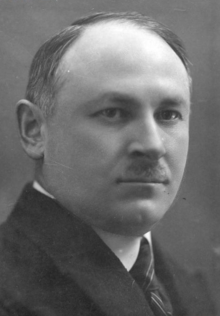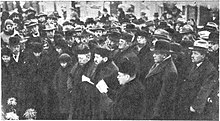Leon Reich
Leon Reich (born June 11, 1879 in Drohobycz , † December 1, 1929 in Lwów ) was a Zionist publicist and politician. He was one of the leading representatives of Jewish interests in Poland after the First World War . He is not related to Wilhelm Reich , whose father was also called Leon Reich.
Life
He studied law in Lemberg from 1897 to 1905 and at the École des Sciences Politiques in Paris from 1908 to 1912 . He received his doctorate as Dr. jur.
During his student days he was already involved in the Zionist movement. He founded the first Zionist student association in Galicia ( Emunah ). He made a name for himself as a journalist and publicist. Between 1907 and 1914 he was editor of the magazine Wschod . In 1910 the Polish Zionist Almanac was published.
From 1911 he was a representative of Galicia at the international congresses of the Zionists. Even after the war he took part in all congresses. In the same year he ran in vain for the Austrian Imperial Council . Nevertheless, its influence among the Jewish population increased. From 1913 he was also a member of the Zionist Action Committee and headed the Palestine Office in Lviv.
During the First World War he worked in the Austrian military jurisdiction. He was deployed in Graz and Lemberg , among others . In 1918 he became President of the Jewish National Council for East Galicia. In connection with the political unrest in Galicia at the end of the war, he was arrested, accused of high treason and temporarily detained in a detention center. He was released under pressure from Western European politicians as well as from Józef Piłsudski and Nahum Sokolow .
In Paris in 1919 he was a leading member of the Comité des Délégations Juives . This endeavored to secure minority rights for Jews in the successor states of Austria-Hungary . In this context he published the font Les Droits nationaux des Juifs en Europe Orientale.
From 1919 he was chairman of the Zionist National Association for East Galicia. In 1922 he was elected to the Polish Sejm for Lviv . He was one of the defenders of Stanisław Steiger in 1924, when he was accused of an assassination attempt on the President Stanisław Wojciechowski . Between 1924 and 1926 he was chairman of the club of Jewish deputies in parliament.
He rejected Zionist maximalism such as Jitzchak Gruenbaum represented and advocated rapprochement with the Polish state. Together with others he negotiated a contract with the government under Władysław Grabski . In it, the Jewish members of parliament pledged their support and received a number of concessions for the Jewish population. On the other hand, there was resistance in their own ranks. After the May coup of Józef Piłsudski, Reich was forced to give up the chairmanship of the Jewish club in parliament. In Galicia in particular, he retained political backing and was re-elected to the Sejm despite the government-supported opposing candidate.
He worked for the Polish-language daily Chwila in Lemberg, Nowy dziennik in Krakow and some Yiddish newspapers. In Warsaw he founded the country's second Polish-language Zionist newspaper called Dziennik Warszawsk . The newspaper could not last long due to financial problems. In 1929 he became a member of the administrative committee of the Jewish Agency for Palestine .
In 1934 his body was exhumed and transferred to Palestine.
Works
- The rebuilding of Poland and the Jews' striving for freedom . In: Neue Jüdische Monatshefte, Vol. 1, Issue 7, January 10, 1917, pp. 177–185.
Individual evidence
literature
- I. Philip: Leon Reich. In: Österreichisches Biographisches Lexikon 1815-1950 , Vol. 9 (Lfg. 41, 1984) pp. 25f.
Web links
| personal data | |
|---|---|
| SURNAME | Rich, Leon |
| BRIEF DESCRIPTION | Polish Zionist publicist and politician, member of the Sejm |
| DATE OF BIRTH | June 11, 1879 |
| PLACE OF BIRTH | Drohobycz |
| DATE OF DEATH | December 1, 1929 |
| Place of death | Lwów |

